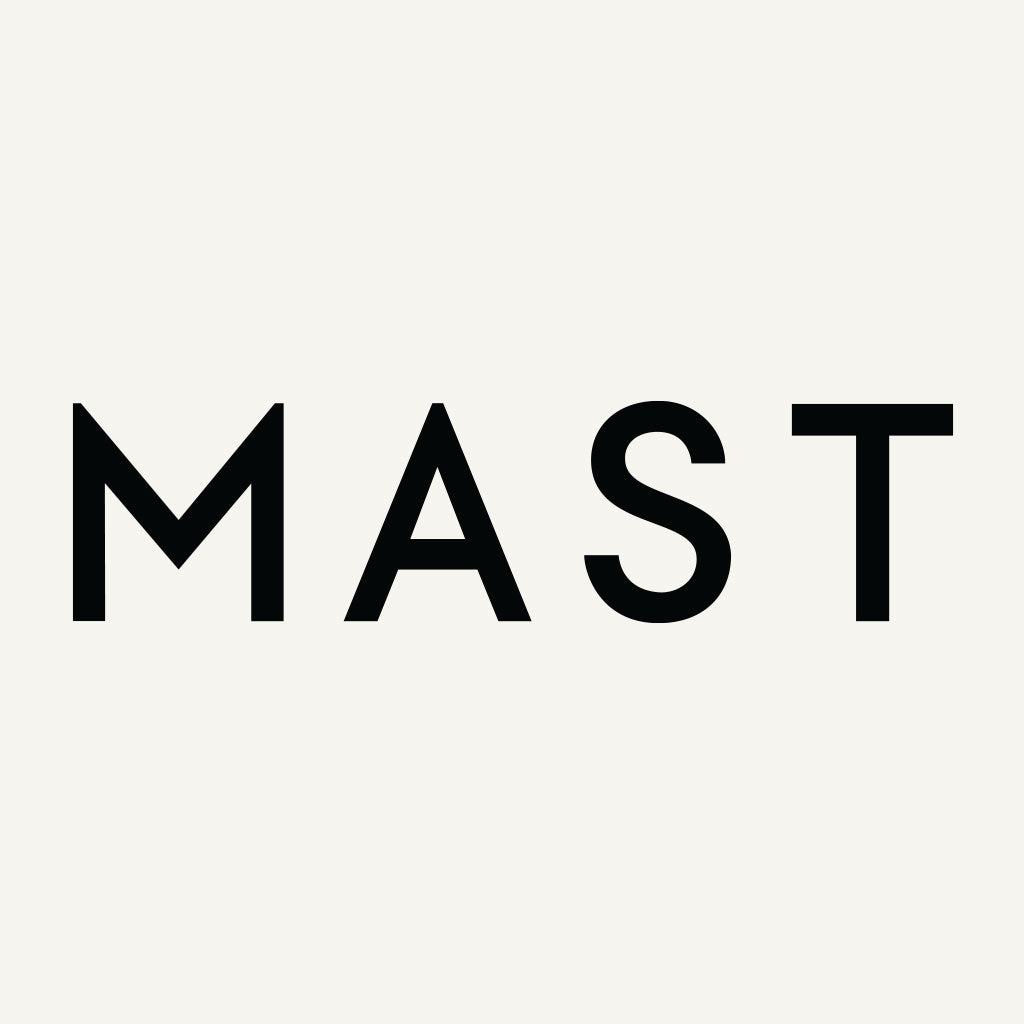Finding the Whey
In conversation with Homa Dashtaki, founder of The White Moustache
For Homa Dashtaki, the founder of small-batch yogurt brand The White Moustache, yogurt is so much more than a dairy product. It's her family tradition, it’s her Iranian heritage, and, most importantly, it’s an art form. “I make yogurt in the traditional way,” she explains. “It's a craft. You're dealing with the most sacred ingredient on the planet, which is milk. And you're infusing it with billions of live probiotics to inoculate it into this gut-healing, hydrating thing.”
New Yorkers must agree because the demand for The White Moustache has Homa’s Red Hook production facility nearly at capacity. Her little glass jars of yogurt, which come in authentic Middle Eastern flavors like sour cherry and dates, line the shelves of the city’s most beloved gourmet grocers. Mast Market, of course, is one of them.
Homa credits her success to the way she values milk, not as a “two-cent commodity,” but as a treasure. She pays near-wholesale prices for local, nutritious milk from Hudson Valley Fresh, an Upstate dairy that depends on her as much as she depends on them. “They're my only source of milk, so if they go down, I go down,” she shares. “Most people think that's a stupid business idea, but I can't tell you how much that floats me when I'm having a bad day. I'm like, ‘They need me to keep going.’ And I need that. I love that.”
Here, Homa shares the origin story of The White Moustache, why yogurt is so magical, and how she is popularizing whey.

Photo credit: Chester Higgins / chesterhiggins.com
Mast Journal: How did you first start The White Moustache?
Homa Dashtaki: I joke about this, but The White Moustache is a miracle. My dad, who has the signature white handlebar mustache, and I started a yogurt company out in California, selling at farmer's markets. We got shut down because of the dairy laws out there. They didn't really allow artisanal dairy. It was just a hobby to start something with my dad, but the minute we got shut down, I got triggered. I had a background in law, as a lawyer, and I felt that what I was doing was so wholesome and so innocent.
For the next two years, I fought the law. I went to Sacramento and I got pro bono counsel and passed cottage food bills that would allow people to bake or make granola or make candy at home to sell at farmers markets. But they struck out the dairy line in the legislation. I knew I was going to die trying. They were going to win. So I came to New York. Brooklyn is such a cliche of a foodie town, but they get it. They were like, ‘Look, we don't have different laws than in California. The laws are actually the same, but walk us through your process and let's see how we can make this happen.’
MJ: New York is the place to be. And it seems like your customers here see how special your yogurt is.
HD: Our customers are fanatical. The best gift that I get from people who buy my yogurt is an email saying that they're disappointed in us for one thing or another. I find that to be such an act of care. How often are you disappointed in someone and you just say nothing? You're like, ‘Fuck off, I am done with you.’ But this person sat down, took minutes, heartbeats of their day to write to me and tell me to fuck off. Not only am I taking whatever you're complaining about seriously, but you're giving me an opportunity to be better. You're giving me an excuse to chat with my team about quality, which I will do all day every day.
And I have made lifelong friends. I remember I had just given birth to my first daughter and somebody was complaining about how the consistency of the dates was different. I'm exhausted, so you would think this person writing in would be demoralizing. But I was like, ‘Hell, yeah.’ So-and-so in Bay Ridge noticed the difference in the dates—because we did switch the dates. It was a minuscule change and only a hardcore true believer would notice. So that was one of the greatest emails I've ever received. This company has built a community like that since 2013.
MJ: That’s very unique for customers to care so much.
HD: We also feel very, very lucky that we get to do this and provide the quality and flavors that are true to our background and history. I grew up in Iran during the Iran-Iraq War and migrated here as a child. I had all the conflicting feelings of being an immigrant here and being embarrassed about my food and my accent and self-erasing myself a lot. I didn't want to be reacted to poorly or to be seen as a threat. I wanted to just fit in and belong and be loved and all the things everybody wants.
I feel very much responsible to these flavors that I grew up with. So we won't have a blueberry yogurt or a chocolate yogurt. Those aren't flavors that we had in Iran. And the Middle East isn't known for its passionfruit, but we will have dates and quince and sour cherry and shallot. We have a savory shallot one. Mast Brothers doesn't carry that yet, but I can't wait to unleash it onto New York.
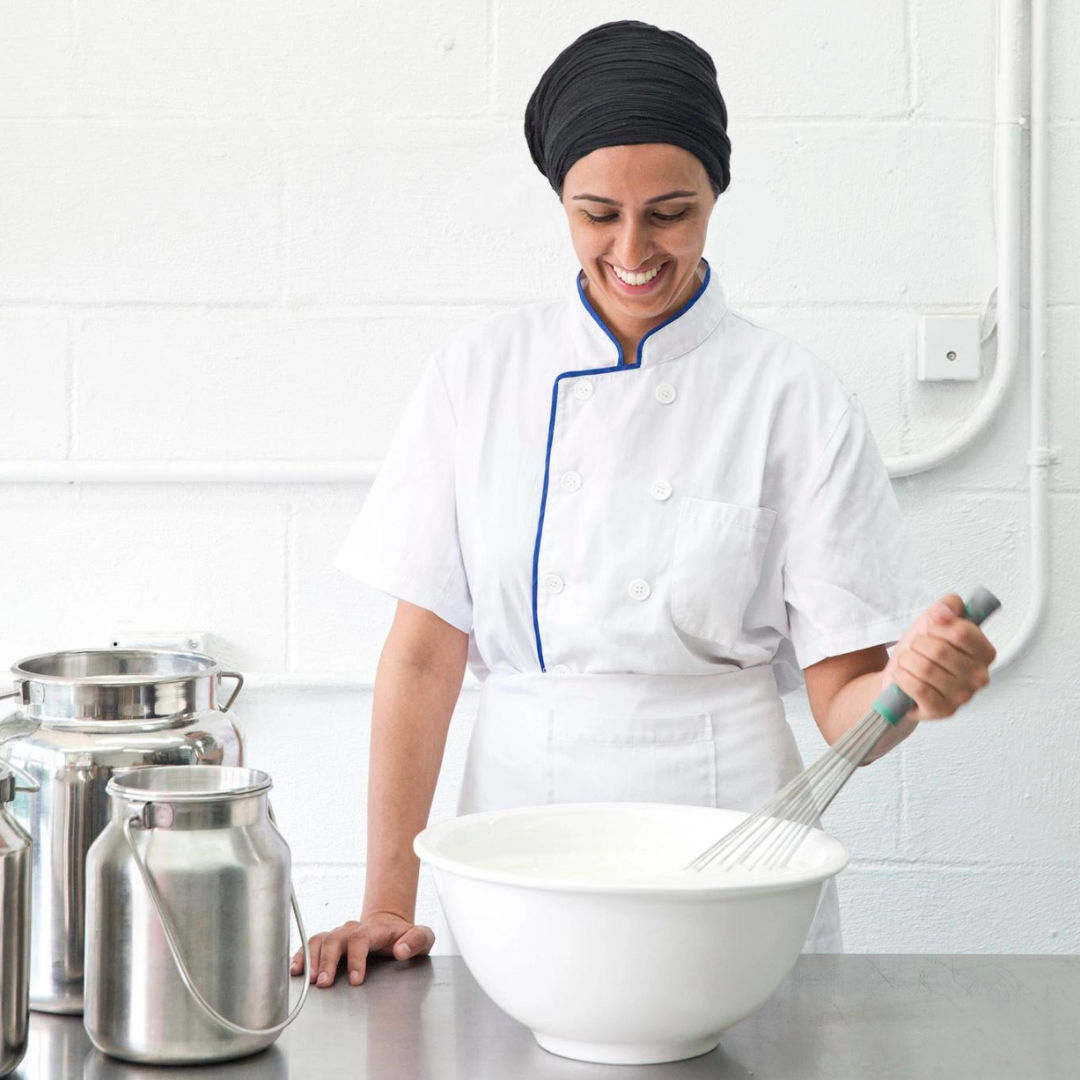
Photo credit: Nicole Franzen / White Moustache
MJ: That sounds delicious. And did you grow up making yogurt when you were in Iran?
HD: I came here when I was eight.
MJ: So you weren’t making your own yogurt at five years old.
HD: No, but it was always being made in the background. We eat gallons of it a week. It's just had with lunch and dinner. It's had as a digestive accoutrement to your meal, like a condiment. And so it was just everywhere. Rice was everywhere and yogurt was everywhere. My dad was always making it at home and my dad was the cook. My mom worked. It's a very matriarchal household. My mom called the shots and earned the income and my dad did all the cooking. And so I remember being annoyed when he would make me make yogurt with him. I was just like, ‘I don't want to do this. I want Yoplait. Americans eat Yoplait. I don't want this immigrant shit we make at home.’ I wanted the sugar, I wanted the packaging. I wanted to be cool. And again, it was a lot of self-erasure.
Now, I feel like I'm healing a little bit of that little girl. I am providing, hopefully, unique flavors to people in our little yogurt jars. Every single jar feels like a moment. And so we're not a volume business. We never want to be. We self-deliver. It's just fanatical attention to detail and excellence. And that's why I love those complaint letters. It's an opportunity to be even better, even when it's totally ridiculous. Somebody emailed once and was like, ‘There's something crunchy in my honey walnut yogurt.’ I'm like, ‘I think that was a walnut.’ But I still was like, ‘This is an opportunity to give somebody a hug and I'm going to do it.’
MJ: Your customers must really appreciate that kind approach. And what’s the difference between the process of making The White Moustache and, for example, Yoplait?
HD: I don't want to knock Yoplait. I think there's room for everybody. I love me my Top Ramen and I love me my Michelin ramen. I love me my Yoplait and my Chobani and I love me my White Moustache. There's room for everybody. What's very unique about White Moustache is this artisanal three-day process. It's not making yogurt in the container that it's sold to you in, but making yogurt in small batches, whisking it by hand, and then putting it in the jar once it's perfect. It's putting in seven different strains of probiotics and thickening it up, not with a centrifuge, but with slowly draining the liquid whey out of it. Also, White Moustache is one of the only yogurt companies that makes a whey drink and doesn’t toss it out. It's a liquid whey, and it is this army of one, it's a drop in the bucket.
But I also recognize that when you're running a larger corporation, you don't have the luxury to not do the thing that makes you money. So I don't knock anybody, but I'm really proud of the really expensive milk that we are able to use and utilize that helps generations of upstate dairy farmers stay in business and keeps the land from being overdeveloped. We just recently made a quince yogurt and we used New York quince to make a jam, and that was very, very special. And that's a really hard fruit to find because most people don't have it.
MJ: What are the health benefits of making yogurt in this way?
HD: Well, it contains calcium and protein from the milk, and it contains vitamin B12. And it contains probiotics, which is where the majority of the mythical magical qualities of yogurt come from. The probiotics help regulate your gut health and also your digestion, which makes you poop really good. And I think that enhances your mood. I think happy pooping makes happy people. If I could have a tagline and that was morally acceptable, that would be it. And I think it helps balance, it helps lighten. I think having live probiotics in your system that are already there be fine-tuned with regular yogurt in your diet is great.
Iranians have yogurt with their meals. So when you're having a heavy meal of rice and meat and stews, you're always having a side of yogurt. Growing up, it was a culinary tradition. But having now lived with it for so long, I'm like, ‘There's a reason.’ It's almost medicinal. It's almost like this is how we digest our very rich, heavy food that we eat. There are people who believe there are far more magical qualities to a probiotic-rich diet, as far as curing autism. And I'm not quite there yet, but it is just wonderful. Everybody is different, but a lot of people who are lactose intolerant write in and say, ‘I can have your yogurt because whatever you're putting in there is consuming the lactose that I have trouble digesting.’ That's just wonderful to hear, but I would never want to claim that for everybody.
MJ: Totally. Do you eat The White Moustache yogurt in the traditional Iranian way, on the side of a hot meal? Or do you eat it the way Americans typically eat yogurt, for breakfast or a snack?
HD: I will rarely have yogurt for breakfast. Personally, I will have the sweet yogurt as a dessert, so either after lunch or as a snack or after dinner. Anything but breakfast, really. Because in my mind, I wouldn't eat yogurt on an empty stomach. The point of yogurt is to digest your food. I've eaten yogurt for breakfast tons of times, but now I mostly stick to it for later on in the day, once there's a little bit more food in my belly. I do have a lot of the savory shallot yogurt by the gallon in my fridge. I still make yogurt at home with my kids to keep that home tradition going and so I can annoy them with it, like my dad annoyed me with it. My yogurt is lumpier than our White Moustache yogurt is.
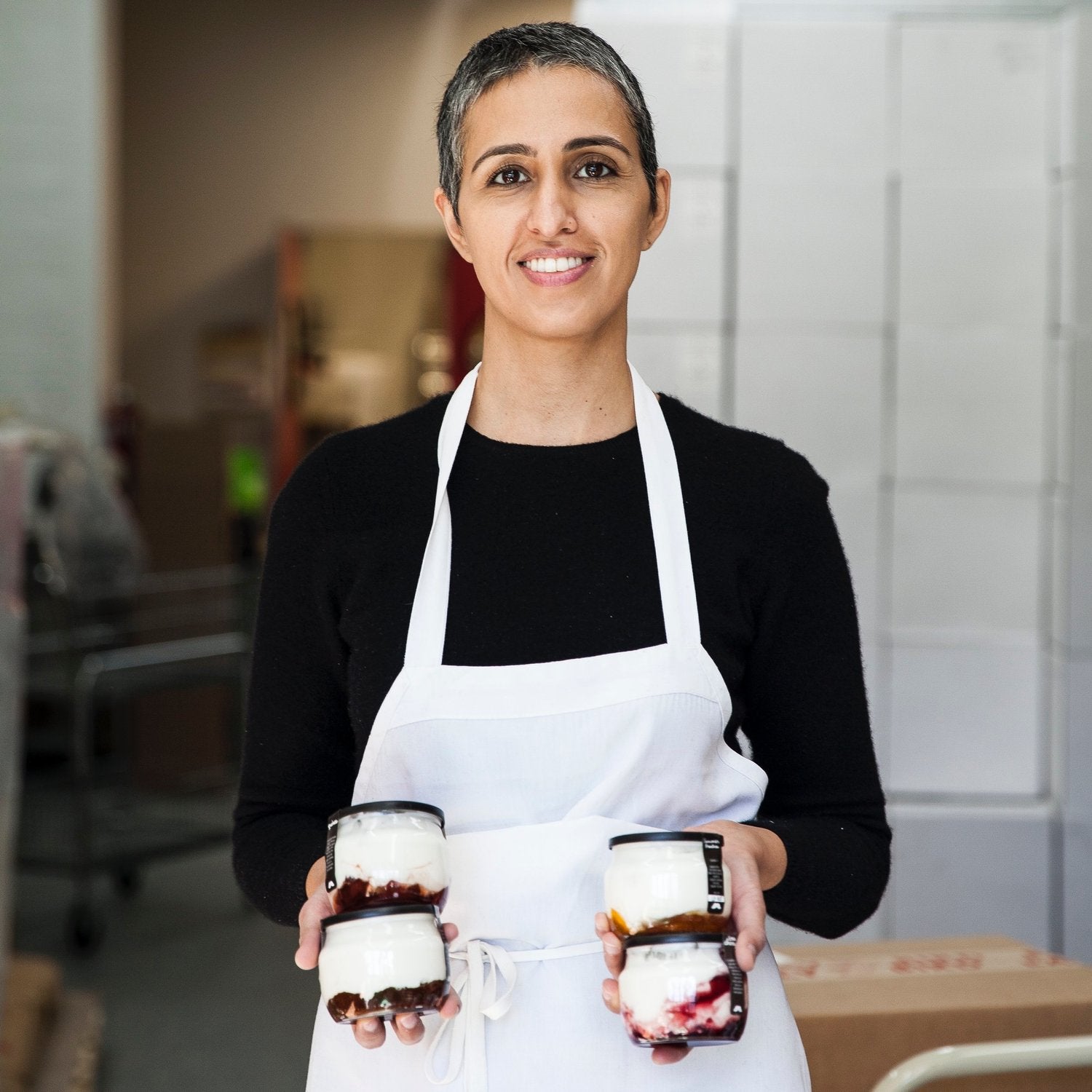
MJ: Got it. And what about the packaging? How did you choose that?
HD: Everything happened with very little thought. I just knew that I wanted to put it in glass because so much work went into it. I wanted to really show off this beautiful, elegant product, from the fruit to the yogurt itself. I wanted to celebrate the three days worth of labor that goes into this yogurt that's going to become part of somebody's moment as they're sitting at their table eating it and part of somebody's DNA after they eat it. I wanted to really honor that with a little bit of beauty. I feel like the yogurt informed us how it wanted to look and how it wanted to present itself. And all we had to do was listen.
MJ: Definitely. What do you envision for the future of the brand?
HD: I don't see any changes for the yogurt. I don't want to listen to my dad's calls for automation. That's not going to change at all. That's just going to stay steady. I'm so proud of how we've built it and what we've built. But where I do see a lot of our growth is in the whey products. We have a line of drinks, we have a line of popsicles, and I'd really like to dedicate this summer to finding an outlet for our whey products.
MJ: Can you share a little bit more about the whey products?
HD: It's unfortunate because I think in the American lexicon, whey is not a very savory, yummy word. People think of protein powders and cheese whey, but nobody really knows what it tastes like. It is just the liquid part of yogurt. Whenever you open up a commercial jar of yogurt and you see that ring of water, that's whey. I think it is even more magical than the yogurt because, when strained out using gravity and a very fine mesh cloth, it's just pure calcium, vitamin B12, and all the probiotics in this incredibly hydrating liquid.
So we put it in a pure whey drink that's mixed with fruit juice. I step out of my traditional flavors and we do have a passionfruit and a pineapple and fruits that embrace more Western culture. I'm not trying to heal anything with the whey. I'm trying to inspire and get excited. And then we have the line of popsicles where we mix fresh fruit with the whey and freeze it. It's still dairy, so the liquid actually freezes with a very nice, creamy mouth feel, but without any fats or solids in it.
MJ: Those sound fantastic.
HD: I recently also published a cookbook that treats the whey as an ingredient. You can slice it, dice it, chop it. You can brine with it, you can pickle with it, you can bake with it, you can cocktail with it, you can ceviche with it. It's a very magical ingredient. I didn't invent it, but I am very frustrated that everyone isn't as excited about it as I am, so I wrote the cookbook to educate people. To me, it's so obvious. I sit with it every day. I know exactly what it is. I know exactly where it comes from. I feel frustrated, as if I was trying to explain what an egg white was to people. But it's been fun. We've built a lot of community, too, around how to use this little ingredient.
More from The Journal
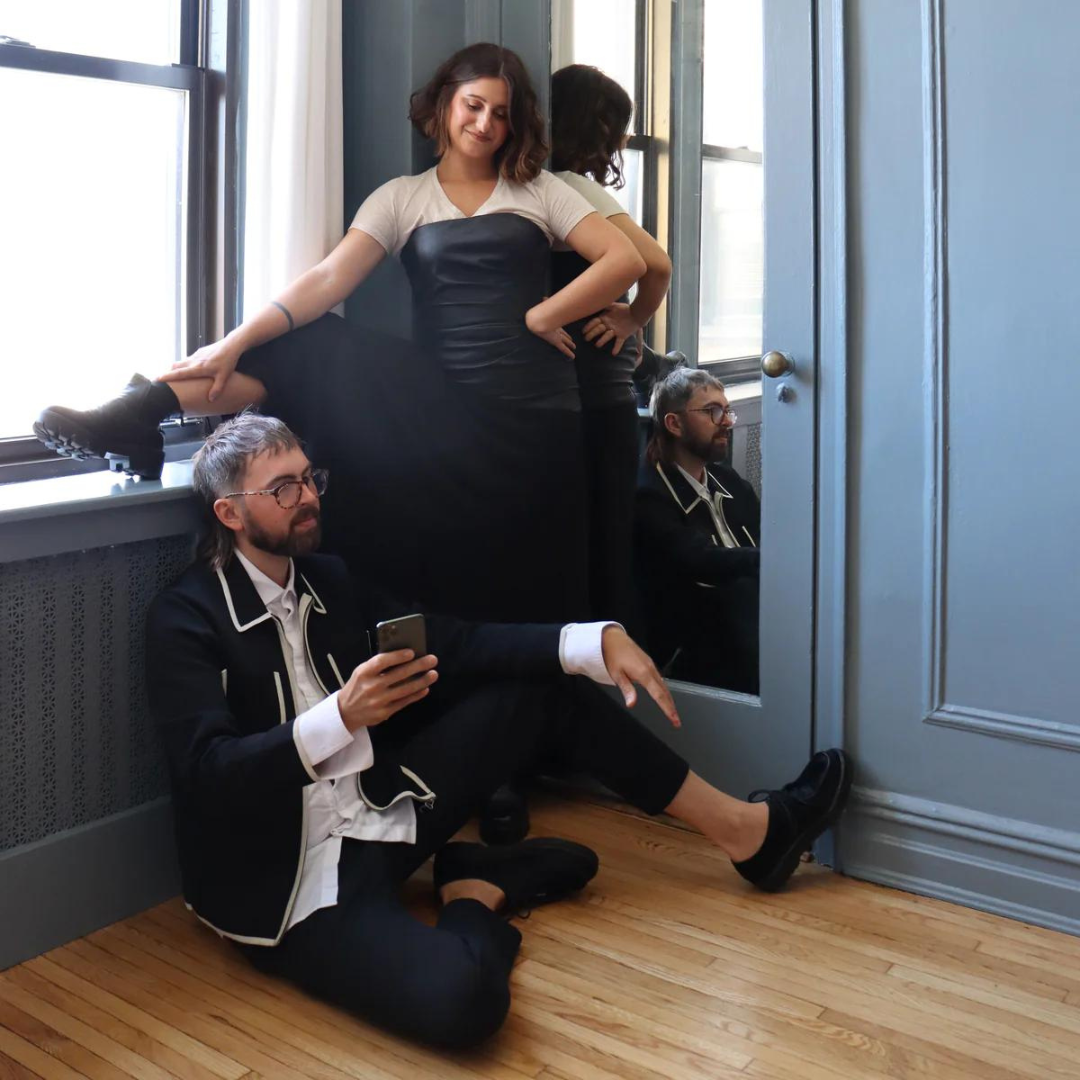
In 2016, Nina and David made their career switch official with the launch of Alder New York, a line of clean, vegan skincare and haircare essentials that meets their own high standards. Here, the d...
Read more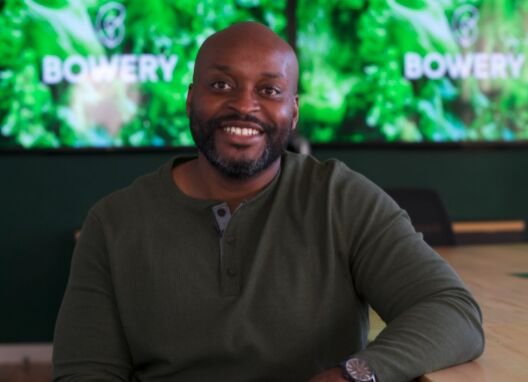
In conversation with Prince Swaray of the vertical farming company, Bowery. He explains what vertical farming is, shares the company’s mission and gives us a taste of the current leafy offerings.
Read more